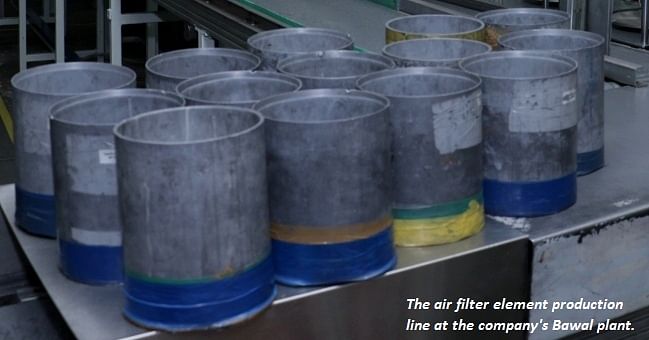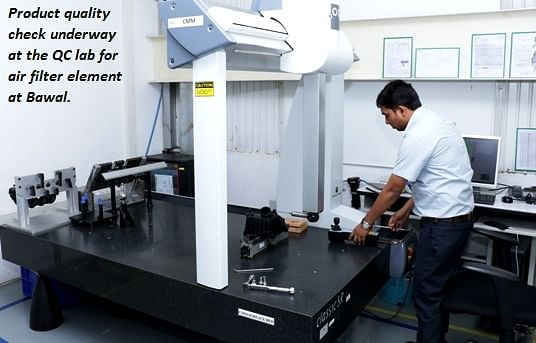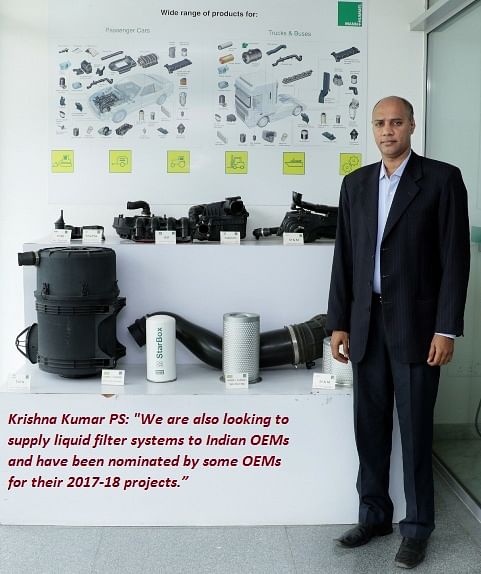Exclusive: Mann+Hummel Filter bets big on its India growth
The global expert for filtration solutions is not only exploring potential to set up a third plant in India but is readying to assist OEMs meet upcoming BS-VI emission norms. We visit the Bawal plant.
German filtration major Mann+Hummel is upping the ante in India. Not only has its first liquid filtration assembly line at Tumkur, near Bangalore, gone on stream but the company has diversified recently into production of integrated crankcase systems.
It is also gearing up for India’s transition to BS-VI emission norms by 2019-20 where it aims to be at the forefront of meeting the filtration challenge for diesel engines.
As part of its broader India roadmap, Mann+Hummel Filter (MHFL) is exploring the potential of setting up a third plant in Gujarat to service key customers Maruti Suzuki India and Ford India, who have set up plants there. While Maruti accounts for 50 percent of its India business, Ford has a 45 percent share.
MHFL has come a long way since 2006 when it set up its first plant at Tumkur to meet OE requirements. In 2012, it expanded with a factory at Bawal, Haryana to supply Maruti Suzuki’s Gurgaon and Manesar facilities. Its initial products for India were air filtration products and air intake manifolds but since 2010 the range has expanded to include air filtration, air handling systems and manifolds as well as air cleaner systems. Recently, it has diversified into integrated crankcase ventilation systems and cylinder head covers as well as technical plastic parts and liquid filtration.
Tumkur and Bawal plants buzz with activity
Since the first quarter of 2016, MHFLbegan production of liquid filtration systems at Tumkur for supply to some OEMs’ export models. Krishna Kumar PS, director – automotive of Mann+Hummel Filter, told Autocar Professional that liquid filters possess integration capability and the oil module manufactured at Tumkur is unique with a cartridge-type element that is eco-friendly and metal-free, with coolers integrated into the oil module. Also, efficiency improvements have been built into the system module to make it a high-end technology product. This leads to better thermal management of the oil system in the vehicle
Starting June, the Tumkur plant kicked off supplies of liquid filter systems to Ford Thailand for its Ranger platform, powered by Puma diesel engines. These filters were earlier made at Mann+Hummel’s Czechoslovakia plant but in line with the Asia growth strategy, it was decided to additionally locate a liquid filtration footprint in India.
“We are also looking at expanding these products to Indian OEMs and have been nominated by some for their 2017-18 projects,” adds Kumar.

A visit to the company’s Bawal plant in Haryana reveals that nearly 90 percent of its supplies are for Maruti Suzuki with the balance 10 percent for commercial vehicles including JCB. The company is a supplier to automotive OEMs, the aftermarket, industrial segment and for water filtration needs.
Till now, Mann+Hummel Filter has invested Rs 80 crore at Bawal and plans to install an additional 6-7 injection moulding machines to support current growth and cater to the new business. At Tumkur too, more liquid filtration lines will be added as volumes ramp up. This vertical has attracted an investment of about Rs 10 crore being a niche project for engine components with machines being designed, developed and made in Germany along with Indian technical experts. The majority of the funding came from India as each local unit is expected to be self-sufficient.
However, the company is not mulling addition of an R&D centre at Bawal at present as its Bangalore facility with 200 engineers can meet the requirements of both plants. The existing Bawal plant is located on a 10-acre site and occupies only 35-40 percent of the area. Running three shifts for Maruti Suzuki, it has adequate space for further expansion and with existing projects and machines has utilised above 70 percent of the production capacity.
A walk around the facility reveals various machines for vibration welding, ultrasonic welding, and for leak checking. Moulded subparts are assembled on the production line after which they undergo a rigorous test and final check before being packed in containers for despatch. The plant has a conveyorised element manufacturing line here. There is also an assembly line for producing cabin air filters for HVAC systems to ensure an odourless and clean car interior.

The factory makes advanced cabin air filters which can also filter the PM2.5 levels with activated carbon sucking in the bacteria that percolates inside. Air filters made at this plant go into all the major Maruti car models.
While the Bawal unit will predominantly meet Maruti’s requirements in Haryana and also the upcoming Gujarat plant, MHFL’s Tumkur unit will continue to supply Ford India. However, the company is open to expanding its manufacturing footprint to where its key customers are located. It is now reviewing plans to set up another plant in Gujarat to cater to both Maruti and Ford albeit a final call is yet to be taken on it.
Readying for BS-VI
With India mandating the transition to BS-VI emission norms by 2019-20, MHFL is ready for the implementation. In 2013, the company introduced its diesel fuel filter with a three-stage water separator globally to address Euro 6 needs; this will now be leveraged for India as well.
Liquid filtration is another area where it can support Euro 6 norms to reduce emissions and CO2 mainly for diesel motors since the company’s forte is diesel technologies. Driving this forward is its emphasis on OEMs’ lightweighting and platform strategies. For instance, metal bowls used in the liquid filter have shifted to complete plastics. “We usually target a 30 percent improvement moving from traditional metal to a high-performance plastic. Most OEMs are now using plastic manifolds, crankcase and cylinder head covers based on what we have developed,” adds Kumar.
Further, OEM platform strategy is a key driver of product designs as vehicle manufacturers collaborate with Tier 1s like MHFL in the pre-qualification stage so that the end product can be applied across the platform to save costs.

Among other MHFL products is the air cleaner system where it is looking at mass air flow (MAF) sensor integration into the air cleaners. The mass air flow sensor typically helps streamline and assess the proper amount of airflow into the combustion chamber.
The company is already supplying a couple of air cleaner systems with MAF sensors to some carmakers in India from Tumkur and is bullish that the upcoming BS-VI emission regime will extend this business further with commercial vehicle manufacturers. Interestingly, cost is not a major inhibitor for OEMs to introduce these products and the component maker maintains that BS-VI norms with stringent expectations on reducing CO2 will be contained with its technology.
While Mann+Hummel Filter is not into Selective Catalytic Reduction (SCR) technology for cleaning diesel tailpipe emissions, it has an alternate solution in urea filters that it claims it has pioneered. These urea filtration systems are being supplied to OEMs in Europe and the company is in talks with a couple of system suppliers for it. In India, OEMs are still to finalise the specific technology they plan to adopt for moving to Euro-6 norms but are in an advanced stage of decision making.
In comparison, in China BS-VI is expected to be enforced around 2017-18 while in Korea it is already in force. Chinese cars run mostly (85-90 percent) on petrol so offer smaller growth potential for companies like Mann+Hummel.
Meanwhile, India is an important market for the company with its car parc set to double over the next six years with a significant diesel proportion necessitating advanced technologies in filtration. Mann+Hummel’s recent acquisition of the Affinia Group has further strengthened its global position against rivals — Mahle, Sogefi, UFI, Donaldson – and made it go all out for the attack.
This article was published in Autocar Professional's July 1 Indo-German special
RELATED ARTICLES
Renault India's Quiet Fixer
As the head of Renault India, Francisco Hidalgo Marques faces his biggest challenge yet.
Tesla’s Test
Unlike in other markets, Tesla has taken a long-game approach in India, focusing on creating the infrastructure first.
‘India’s E20 Strategy Is the Template Europe Now Needs’
Mahle CEO Arnd Franz believes India’s flex-fuel shift is proving more resilient and market-aligned than the EU’s all-ele...






 By Shobha Mathur
By Shobha Mathur
 14 Jul 2016
14 Jul 2016
 23733 Views
23733 Views









